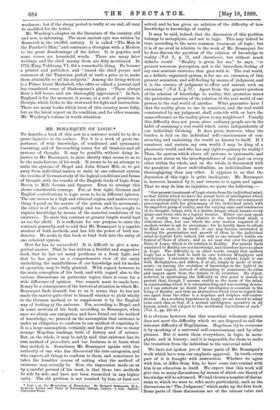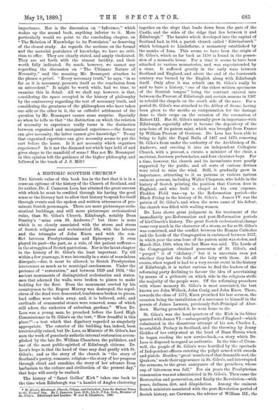MR. BOSANQUET ON LOGIC.* To describe a book of this
sort in a sentence would be to do a grave injustice to the author. For it is a work of great im- portance, of wide knowledge, of condensed and systematic reasoning, and of far-reaching issues for all thinkers and all systems of thought. It may be possible, without doing in- justice to Mr. Bosanquet, to state shortly what seems to us to be the main feature of his work. It seems to be an attempt to unite the systems of Hegel and John Stuart Mill, or. to get away from individual names, to unite in one coherent system the results of German study of the logical conditions and forms of thought, with the results of the English study of logic, from Bacon to Mill, Jevons, and Spencer. Even to attempt this shows considerable courage. For, at first sight, German and English contributions to logic seem to be in different spheres. The one moves in a high and ethereal region, and makes every- thing depend on the nature of the notion and its movement; the other is of the earth, earthy, and too often has sought to explain knowledge by means of the material conditions of its existence. To state this contrast at greater length would lead us too far afield. It is sufficient for our purpose to state the contrast generally, and to add that Mr. Bosanquet is a capable student of both methods, and has felt the power of both ten- dencies. He seeks in this book to bind both into the unity of one coherent system.
How far has he succeeded? It is difficult to give a cate- gorical answer. That he has written a fruitful and suggestive book, that he has set many problems in a fresh light, and that he has given us a comprehensive view of the unity underlying the manifoldness of our knowledge and its modes of operation, may be fully granted. With regard, however, to the main conception of his book, and with regard also to the various discussions on particular topics, there is room for a wide difference of opinion. One remark must be made here. It may be a consequence of the historical situation in which Mr. Bosanquet finds himself, but to us it seems that he has not made the matter quite clear to himself whether to yield wholly to the German method, or to supplement it by the English way of looking at the universe. For, according to Hegel, and in some sections of his book, according to Bosanquet, when once we obtain our categories, and have found out the method of knowledge, we proceed on the assumption that existence is under an obligation to conform to our method of cognising it. It is a large assumption, certainly, and has given rise to many strange Hegelian readings both of history and of science. But, on the whole, it may be safely said that existence has its own method of procedure, and our business is to learn what that method is. Sometimes Mr. Bosanquet speaks with the authority of one who has discovered the true categories, and who expects all things to conform to them, and sometimes he takes the humbler course of asking what the method of existence may actually be. Now, the impression made on us by a careful perusal of his work, is that these two methods lie side by side, and have not been reconciled in any higher unity. The old problem is not touched by him, at least not • Logie ; or, the Morphology of Knowledge. By Bernard Bosanquet, formerly Fellow and Tutor of University College, Oxford. 2 vols. Oxford : Clarendon Press. solved, and he has given no solution of the difficulty of how knowledge is knowledge of reality.
It may be said, indeed, that the discussion of this problem belongs to metaphysic, and not to logic. This may indeed be true, according to the more common treatment of logic ; but it is of no avail in relation to the work of Mr. Bosanquet, for he does discuss the question of the relation of knowledge to reality (Vol. I., p. 77, and elsewhere), but without much definite result. "Reality is given for me," he says, "in present sensuous perception, and in the immediate feeling of my own sentient existence that goes with it. The real world, as a definite organised system, is for me an extension of this present sensation, and self-feeling by means of judgment, and it is the essence of judgment to effect and sustain such an extension." (Vol. I., p. 77.) Apart from the general question of the relation of knowledge to reality, this quotation raises the particular question of the relation of the real world of one person to the real world of another. What guarantee have I that the reality given to me in sensation, and the real world constructed by my judgment, shall coincide with or have the same reference as the reality given to my neighbour Usually this difficulty does not press, since ordinary people are in the habit of assuming a real world which exists independently of our individual thinking. It does press, however, when the burden is laid on the individual self-consciousness of con- structing and sustaining the world as known to itself. If I construct and sustain my own world, I may be king of a phantastic world, and who has any right to gainsay its reality ? Thus, the system which above all systems is systematic, and lays most stress on the interdependence of each part on every other within the whole, and on the whole, is threatened with the paralysis of sheer individualism, an individualism more thoroughgoing than any other. It appears to us that the discussion of this topic is quite inadequate. Mr. Bosanquet is, however, haunted by it, and returns to it again and again. That we may do him no injustice, we quote the following :— "Our present treatment of Logic starts from the individual mind, as that within which we have the actual facts of intelligence which we are attempting to interpret into a system. But our consequent preoccupation with the phenomena of the individual mind, with its imperfect grasp of reality, and the varying aims and tendencies of its thought, brings with it a double danger which haunts every phase and every idea in a logical treatise. Either one may speak as if reality were simply relative to the individual mind, a ridiculous idea, but one which the very caution required of a modern writer is apt to encourage ; for he hardly dares to allude to Mind as such, or in itself : or one may become interested in tracing the germination and growth of ideas in the individual mind as typical facts indeed, but only as one animal's habits are typical of those of others ; and so we may slur over the primary basis of Logic, which is its relation to Reality. For mental facts unrelated to Reality are not knowledge, and therefore have no place in Logic. The difficulty is, in other words, simply that modern Logic has a hard task to hold its own between Metaphysic and psychology. I entertain no doubt that, in content, Logic is one with Metaphysics, and differs, if at all, simply in mode of treat- ment,—in tracing the evolution of knowledge in the light of its value and import, instead of attempting to summarise its value and import apart from the details of its evolution. My object, however, in mentioning the difficulty at this point is merely to protest that, though I assume reality as the norm of the mind, in constructing which it is reconstructing and not creating de novo, yet I can entertain no doubt that intelligence is essential to the being of Reality, and that an abstraction which tries to regard the one apart from the other is a hopeless and helpless self-contra- diction. As a working hypothesis in Logic, we are forced to adopt some such idea as that of a normal intelligence operative in all human minds, but subject to the accidental limitations of each." (Vol. I., pp. 247-48.) It is obvious, however, that this somewhat vehement protest does not meet the difficulty which we are disposed to call the inherent difficulty of Hegelianism. Hegelians try to overcome it by speaking of a universal self-consciousness, and by other phrases. But it meets them everywhere, in logic, in meta- physic, and in history ; and it is impossible for them to make the transition from the individual to the universal mind.
We have not spoken yet of those parts of Mr. Bosanquet's work which have won our emphatic approval. In truth, every part of it is fraught with instruction, Whether we agree with him, or differ from him, to have come into contact with him is an education in itself. We expect that this work will give rise to many discussions, by means of which our theory of knowledge will be advanced. We had chosen a number of discus- sions to which we were to refer more particularly, such as the discussions on " The Judgment," which make up the first book. Some parts of these discussions are of the utmost value and importance. Nor is the discussion on "Inference," which makes up the second book, anything inferior to it. More particularly would we point to the concluding chapter, on "The Relation of Knowledge to its Postulates," as deserving of the closest study. As regards the sections on the formal and the material postulates of knowledge, we have no criti- cism to offer. They are clearly stated, and amply vindicated. They are set forth with the utmost lucidity, and their worth fully indicated. So much, however, we cannot say regarding the discussion on "The Ultimate Nature of Necessity," and the meaning Mr. Bosanquet attaches to the phrase a priori. "Every necessary truth," he says, "in so far as it is necessary, presents itself as the conclusion from an antecedent." It might be worth while, had we time, to examine this in detail. All we shall say, however, is that, considering the space occupied in the history of philosophy by the controversy regarding the test of necessary truth, and considering the greatness of the philosophers who have taken one side or the other in it, the ex eathedrci settlement of the question by Mr. Bosanquet causes some surprise. Specially so when he tells us that "the distinction on which the relation of necessity to experience really turns is the distinction between organised and unorganised experience,—the former can give necessity, the latter cannot give knowledge." To say that organised experience can give necessity seems to put the cart before the horse. Is it not necessity which organises experience ? Is it not the diamond net which lays hold of and gives shape to the manifold of sense? Has not Mr. Bosanquet in this opinion left the guidance of the higher philosophy, and followed in the track of J. S. Mill P



































 Previous page
Previous page